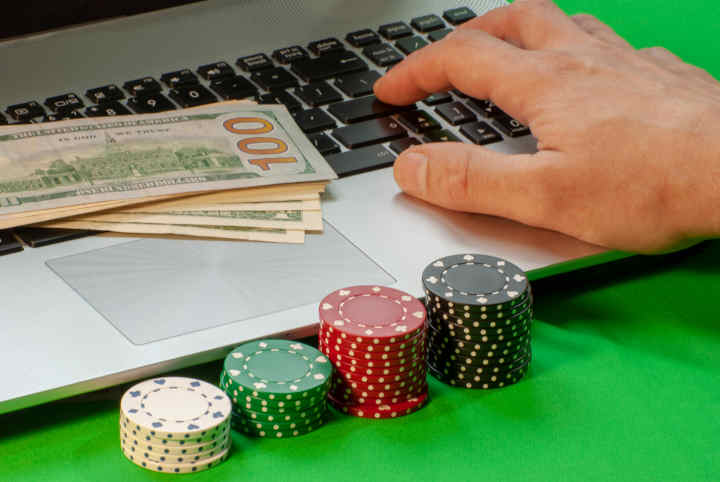Poker Solver Definition – Lean How a Solver Can Help You Win More

10 minutes
Back in the day, even the best poker players analyzed poker hands with a lot of bias and based on assumptions and educated guesses, but this is no longer the case.
It seems like these days, no serious poker discussion can go by without someone mentioning a poker solver, the GTO solution, or what the optimal decision was.
Poker solvers have revolutionized the way top poker players study the game and have even made their way to the mainstream poker community, with players at all levels using them to better their game.
But what exactly is the poker solver definition, how can you use this software to improve your game, and how do you even start with using one?
I am going to explain the most important concepts related to poker solvers if you are completely new to them and introduce you to the magical world of GTO poker, where you no longer need to guess what the right play is.
What Are Poker Solvers?
In very simple terms, poker solvers are pieces of software that use math to solve situations in poker based on the parameters a user inputs into them.
Solvers use very complex mathematical equations to come up with their solutions, and the numbers they come up with take into account every imaginable variable.
Yet, there are some variables that solvers are not yet completely adept at taking into account, especially in multi-way pots.
This is exactly what makes them ideal for learning how to play heads-up.
That said, a poker solver can also help you become an amazing tournament or six-max player, too. The the outputs you will get from a solver will always be closer to correct than anything an average poker player can come up with.

Poker solvers are a very new thing in the game as well, as they only became commercially available around 2015, with some versions previously available to a select few high-stakes pros.
Today, just about anyone can get a poker solver, but simply getting one and using one correctly are two very different things.
So, how exactly does a solver work, what kind of inputs will you need to give it, and what kind of outputs can you expect to get from it? Let’s find out!
Using a Poker Solver
There are several easily accessible poker solvers out there, such as PioSolver and GTO+. These solvers are a bit more expensive than other poker software out there but well worth the money if you know how to use them effectively.
The first step you will need to take is obviously to purchase a solver and install it on your computer, which will make you ready to actually run your first solver simulations.
Once you have a solver installed on your computer, you will be able to run simulations of various poker hands, with the solver giving you optimal solutions for those situations.
You can input just about any hand imaginable into a poker solver. This means you can simulate both real poker hands you played and imaginary ones you come up with in your head.
In order to get the solver to give you some solutions, you will need to input the parameters of the hand, which include:
- Players’ preflop ranges
- Players’ stack sizes
- Pot size
- Players’ preflop ranges
- Betting and raising size options
This is exactly where we run into some limitations of a poker solver. As you can imagine, it is not possible to know the exact range your opponents will have in certain spots, nor is it possible to know the exact bet and raise sizes they might decide to use on various streets.

For that reason, you will be doing a little bit of guesswork in these areas. However, if you are playing relatively competent opponents, you will be able to come up with reasonable ranges and sizes.
What’s even more, you can run multiple sims and see what happens when you change your opponent’s range by adding hands or taking hands out of it.
The game of Texas Hold’em is, in fact, impossible to solve because there is an endless number of possibilities in terms of sizing on each street. Yet, solvers come pretty close to giving you optimal solutions.
It is also worth noting that you can use your experience to input reasonable ranges and bet sizes, which means you will come very close to simulating real poker hands that will come up at the tables.
Another way you can use poker solvers is by inputting the exact way you played a certain hand and finding out if the solver likes your lines or not.
The Solver Outputs: What to Expect
When they are first introduced to poker solvers, many players expect a magical solution to all their problems.
They think a solver will give them an easy solution to every hand, which will allow them to print money.
The reality is a bit different. Solver outputs will tell you how to play a whole range of hands on a certain flop, turn, or river, and it will often tell you to play certain hands in that range in several different ways.
You may end up needing to vary between checking, betting small, and betting large with a certain hand on the flop or turn, which can be a bit confusing.
With the solver giving you so many different things to take into account, it can be impossible to remember the exact outputs.
For that reason, many players simplify their solver solutions by putting their hands into groups, reducing the number of sizings they use, and otherwise simplifying their play.
Doing all this will help you memorize your solver outputs while also making you play less than optimal in relation to the solver’s solutions.
The one thing to remember is that you don’t need to play perfect poker, you just need to play better than the next guy in order to win.
What is Game Theory Optimal (GTO) Poker?
If you are an old-school poker player who learned to play poker back in the day, or even during the days of the poker boom, you may be left scratching your head right now.
I said that you need to tell the solver stack sizes, preflop hand ranges, and potential bet sizes, but what about things like Poker Tracker 4 stats and your opinion of how an opponent plays?

Well, the truth is that poker solvers don’t care about such inputs at all, as they give you game theory optimal (GTO) outputs that work against literally everyone.
You read that right. If you play the GTO strategy suggested by the solver, you will end up beating anyone in the world, regardless of the way they play.
This may sound silly, but it is actually true.
As long as the hand is played heads-up, there is no way for your opponent to beat the solver’s solutions in the long run.
Of course, the solver will still lose hands, but it will come up as the winner in the long run against any opponent out there, regardless of their style.
This new school of poker has caused quite a stir among some players who believe the computer can’t possibly tell them how to play perfectly, but many players have proven that it can.
In fact, all the top players playing these days are using poker solvers to study the game, and most of them have come up in the solver streets, learning the game one simulation at a time.
If you don’t believe just how good solvers are at heads-up poker, simply look at the way Doug Polk crushed the much more experienced Daniel Negreanu in their duel strictly by using the GTO solutions that came straight out of a solver.
How to Study Using Solvers
I have explained what kind of inputs your solver will be expecting, as well as the kind of outputs you can expect it to give you, but it probably sounds like a whole lot of rubbish up to this point if you haven’t used a solver in the past.
You are probably still wondering how exactly you are supposed to use a solver and its outputs to study the game of poker and get better.
The answer is actually both quite simple and quite complicated. The way players study using solvers is by running simulations of different poker hands.
For instance, you may input the flop of 5d 5s 3d in a single raised pot where you are the button, playing against the big blind who called your raise, and the effective stack size is 100bb.

From experience, you will need to input a reasonable range for your big blind opponent, as well as input the range you are using when opening the button.
Once you have done all this, the poker solver will tell you which of your hands you are supposed to bet and which of them you are supposed to check with what frequency.
The solver will make sure that your strategy is perfectly balanced so that all your value bets, bluffs, and checks are making the optimal amount of money given the board and your opponent’s perceived range.
Once you get this output, all you can really do is memorize it to the best of your ability and then do the same for the next flop, the next, etc.
Now, of course, since there are so many possible boards and so many possible positions and situations, you will never be able to remember all the outputs.
Instead, you are supposed to study and start recognizing patterns and the basic ideas that the solver is using to play certain boards.
Don’t get me wrong, it will take hundreds, if not thousands of hours to learn how to play the game in a similar way to the solver, but the results will be well worth it.
Things to remember with poker solvers are that you need to enter realistic inputs into the software if you want good outputs and that you should try to understand why the solver plays the way it does.
If you can understand the notions behind solver’s play, you will become able to deduct your own plays in the future without even looking at actual sims.
This may take a lot of time and effort, but once you reach this level of proficiency, you will be able to take on anyone in the world and come out victorious.
Poker Solver Limitations
I think I have hyped up the solvers enough, so now may be the time to talk about their limitations and deficiencies.
Like any tool out there, solvers are not perfect, and there are things they lack and could be doing better.
For starters, solvers don’t have any real way to predict ranges, and this will forever remain a problem, as there is no way to know what range a player is playing in a certain situation.
In the real game, players add hands to their range out of tilt, fold hands they should play because they are tired or bored, and many other things.
Furthermore, solvers always focus on providing you with a GTO solution, but these solutions are not always the best against a particular opponent.
While a GTO strategy will make some money against anyone, you could make much more money from some opponents by using an exploitative strategy, which is what many players still do.
When playing against particularly bad opponents, an exploitative strategy will always be superior to a GTO one, as you will be able to win many extra chips by exploiting their tendencies.

As your adversaries get better, the GTO strategies will become the safer way to go, as you are faced with fewer mistakes on their part, and more GTO plays from their side.
Finally, it should also be noted that poker solvers are not great at solving multi-way situations, as there is simply too much to deal with, and the solutions are never perfect.
Yet, there isn’t a tool in the world that will help you learn poker on a higher level than a poker solver. I highly recommend getting one if you have any plans of making it big in poker in the future.
Final Warning: When Not To Use a Poker Solver
One thing you should remember is that poker solvers are just a learning tool, not one that’s meant to be used to help you play poker.
What I mean by this is that no major poker site allows you to run a poker solver simultaneously with their platform, and you will get banned if you try to do it.
Trying to run sims while playing an actual game won’t be very effective either, as you simply won’t have the time to do it.
Yet, if you use a poker solver while playing poker, you will likely get banned from your favorite poker site, while the help you will get from the software this way will be minimal at best.
- Poker Squeeze Play – Which Hands Make the Most Sense for Squeezing? - August 10, 2023
- How to Play Low Pocket Pairs in Texas Hold’em - July 29, 2023
- How to Make Deep Runs in MTTs More Often - July 22, 2023















